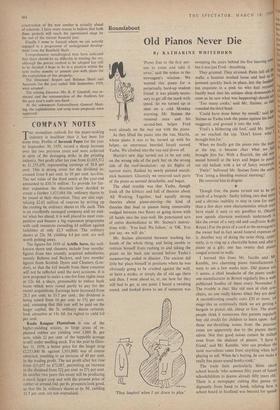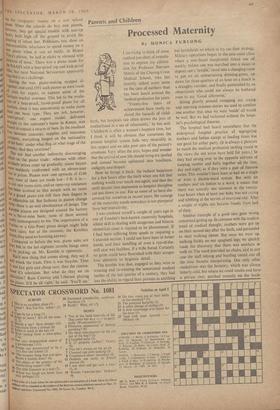Roundabout
Old Pianos Never Die
By KATHARINE WHITEHORN As they lifted the piano into the van, Martin, whose piano it was to be, turned up with his helper, an enormous bearded Israeli named Yasha. We climbed into the van and drove off.
Martin's new digs turned out to be not only on the wrong side of the park but on the wrong side of the roof-insulation : up six flights of narrow stairs, flanked by newly painted match- stick banisters. Gloomily we removed such parts of the piano as seemed detachable, and began.
The chief trouble was that Yasha, though fresh off the kibbutz and full of theories about All Working Together, had equally strong theories about piano-moving—the kind of theories that lead to pianos being immovably wedged between two floors or going down with all hands into the stair-well. He punctuated acts of entire disobedience to Mr. Staines's instruc- tions with : 'You lead. We follow,' or 'OK. You just say, we will do.'
Mr. Staines alternated between washing his hands of the whole thing, and being unable to restrain himself from rushing in and taking the piano on his back one second before Yasha's manoeuvring ended in disaster. The ancient did little but place himself in positions where he was obviously going to be crushed against the wall, or have a stroke, or simply die of old age there and then. I went ahead to, er, see how far they still had to go; at one point I heard a swishing sound, and looked down to see if someone was 'They laughed when I sat down to play.'
sweeping the stairs behind the five heaving men; ' ea but it was just Fred—breathing. Lb They grunted. They strained. Paint fell oft ' ‘it walls; a banister worked loose and had to 11° jammed quickly back in place, lest the landlord (an exquisite in a pink tie who had retreated to
all . hastily back into his antique shop downstairs
soon as he saw what was happening) should se‘' 'Too many cooks,' said Mr. Staines, as thel ti rounded the third bend.
M' 0 'Could have done better by meself,' said 0. Staines as Yasha took the piano against his bath staggered, and ground it into the wall. st
'Fred's a blithering old fool,' said Mr. Stair° ft as we reached the top. 'Don't know what 11 brought him for.' cI When we finally got the piano into the NO ° at the top, it became clear what we bad it brought .tim for. With a flourish, the old u1311 seated himself at the keys and began to pound e out old ballads with a lot of fancy wristworl:'
'FRED!' bellowed Mr. Staines from the stairs. 'You 'aving a bleeding musical morning?'
He removed him in disgust.
Though free, the piano turned out to be not much of a bargain : faulty felting, two dud notes and a chronic inability to stay in tune for more than a few days were characteristics which mo't have made it easy to say goodbye to. (Martin now spends alternate weekends underneath it, like the owner of a very old and souffrante Rolls' Royce.) For the price of a card at the newsagent's, the owner had in fact saved funeral expenses on it. Another way of doing the same thing, appal' ently, is to ring up a charitable home and offer piano as a gift; one has twenty dud pian ranged around its walls.
I learned this from Mr. Jacobs and Mr Kemble, two charming piano manufacturers went to see a few weeks later. Old pianos at it seems, a chief headache of the piano trade: one manufacturer in Bristol regularly has a well• publicised bonfire of• them every November The trouble is that, like old men in club arr chairs, no one really knows when they are dead. A reconditioning usually costs £50 or more, yet mugs'like us continually think we are getting a bargain in pianos old, cheap or free. The piano people think it monstrous that parents regularly buy old crocks for children to learn upon : half those ear-throttling noises from the practice- room are apparently due to the pianos them- selves. Not that good noises cannot be milked even from the shakiest of pianos. 'I have a friend,' said Mr. Kemble, 'who can produce the most marvellous tones from anything when he's playing to sell. When he's buying, he can make a really fine piano sound honky-tonk.'
The trade feels particularly bitter about school boards 'who sentence fifty years of future schoolchildren to pianos already fifty years old.' There is a newspaper cutting that passes in' dignantly from hand to hand, relating how school board in Scotland was berated for spend' a os
5.
a
SPECTAT()R. MARCH 18, 1960 ing the ratepayers' money on a new school P,lann. When the schools do buy new pianos, backs, they get special models with non-tip backs, built high off the ground to avoid the grinding of infant feet. Publicans, too, show an understandable reluctance to spend money on a ,new Piano when it can so easily, in Honor Tracy's phrase, 'be laid in sticks or silenced with cataracts of stout.' There was a piano made for the NAAFI with a beer-proof top and kick-proof Sides; but most National Servicemen apparently regarded it as a challenge. During the war, piano-making stopped al- together, and until 1951 such pianos as were made all went for export, to capture some of the German market overseas. This led to the evolu- tion 1)f a heat-proof, travel-proof piano for all markets, since it was uneconomic to make more than one basic type. They are not, however, insect-proof: : one export model, delivered found to the customer's home in Kenya, was fusss between customer, supplier and insurance company, everything hinged on the nationality ,s, the bees: under what flag, at what stage of the journey, had they swarmed? The war had another indirectly discouraging effect on the piano trade: whereas with other Products prices crept up gradually, piano buyers were suddenly confronted with an eleven-year rise in prices. Pianos now cost upwards of £140 new; most of them are made low--3 ft. 6 in.— t Lo snit new room sizes, and an open-top miniature has been evolved so that people with no room fur a grand piano can still slam their fingers in .14.n adjustable lid. But fashions in pianos change there is no real obsolescence of design. The ^emblepianos are designed around the factory ()11 a hit-or-miss basis; none of them seemed really contemporary to me. The importation of a farina or a Gio Ponti piano design might help boost sales; but at the moment, the Kembles claim, they need no boosting anyway. Compared to before the war, piano sales are °'\+; but in the last eighteen months things seem in be picking up. Mr. Kemble is optimistic. 'each new thing that comes along, they say it will Wreck the trade. First it was bicycles. Then 1` Was fast girls and cheap cars; then the cinema. Now it's television. But what do they see on ti,elevision? Russ Conway and Liberace playing `le Piano. It'll be all right,' he said. 'You'll sec.'



































 Previous page
Previous page